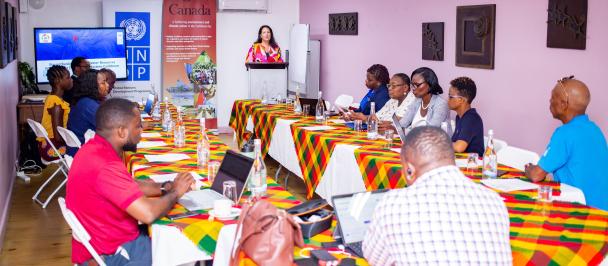EnGenDER's Inception Workshop
UNDP is launching a multi-million-dollar project in nine Caribbean countries, with generous support from the Government of Canada and the UK Department for International Development.
UNDP’s prior support to the development of National Adaptation Plans (NAPs) and Nationally Appropriate Mitigation Actions (NAMAs) will now be scaled up by the new project - Enabling Gender-Responsive Disaster Recovery, Climate and Environmental Resilience in the Caribbean (EnGenDER). The NAP process was created by the United Nations as an opportunity for countries to plan for sustainable development in the face of climate stress while NAMAs, on the other hand, focus on mitigation – reducing greenhouse gas (GHG) emissions.
EnGenDER will support the implementation of priority areas, as identified by partner governments, within these policy documents, ensuring that plans are gender-responsive – considering the vulnerabilities, strengths and needs of different groups of women and men. This work will be undertaken through consultative and participatory approaches, with key stakeholders identifying and leading priority actions.
Remarking on the collaborative approach the project has taken, UNDP’s Resident Representative for Barbados and the Organisation of Eastern Caribbean States (OECS), Mr. Magdy Martinez Soliman, noted: “Canada and the UK have been working collaboratively in the region for many years and this project provides a new opportunity to demonstrate our commitment to increasing resilience in the Caribbean. It is anticipated that the partnerships built at the regional and national levels will produce important results as the region faces the increasing impacts of climate change.”
With UN Women, partnering to build capacity in developing gender-responsive plans, and conducting behavioural analysis of gender-responsiveness in risk governance among decision makers, and with the World Food Programme (WFP) working to enhance social protection systems to make them more shock-responsive, the UN is delivering as one. UNDP is also deepening its cooperation with the Caribbean Disaster Emergency Management Agency (CDEMA) to establish the Caribbean Resilient Recovery Facility which will assist countries in strengthening their systems for post-disaster recovery.
In coordinating this collaborative project, UNDP continues to foster multisector approaches drawing on the strengths and expertise of all UN agencies. The UN system is tasked to deliver as one and UNDP considers such integration necessary for countries to accelerate the achievement of the sustainable development goals.
EnGenDER will integrate a gender equality and human rights-based approach into disaster risk reduction, climate change adaptation and environmental actions. This will ensure equal access to sustainable solutions for the improved resilience of women and men in Antigua and Barbuda, Belize, the Commonwealth of Dominica, Grenada, the Cooperative Republic of Guyana, Jamaica, Saint Lucia, St. Vincent and the Grenadines and the Republic of Suriname.

 Locations
Locations



